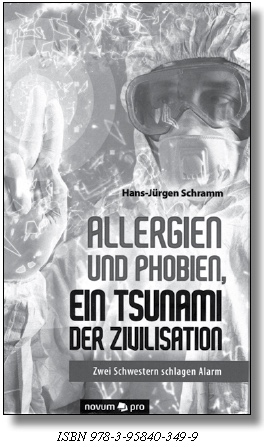Even in medicine it depends on the concept of man
Even in medicine it depends on the concept of man
An important book: “Allergien und Phobien, ein Tsunami der Zivilisation”
by Dr med. Thomas Lippmann
Hans-Jürgen Schramm, doctor of psychosomatic medicine and psychotherapist in the Neustädter Land near Hannover fears a relapse into medieval conditions. Bygone epidemic plagues threaten to break out again. Responsible for this are a physical, mental and emotional exploitation of man as well as the current political distortion of the term sustainability. Schramm warns against the breeding of “cyborgs” and reminds of an urgently necessary reversion to the respect for human life and makes the case for more personal responsibility.


His book entails a momentous scientific discovery. We all could be affected. Considering the threateningly rising number of mentally ill and allergy sufferers there is the danger of an entire exhaustion of immunologic capacities. The book presents the hypothesis of a dual danger for mankind, a relation of allergy and phobia (a form of anxiety). This theoretical part provides a lot of food for thought, always with the aim to integrate – regarding somatic diseases – immaterial, up to now unknown, especially emotional influences – in the proper sense of psychosomatic.
The author draws on a big fundus of psychological, experience-based knowledge. He so dedicates this book to “the countless people who seeked medical aid from me as patients throughout many decades. They all became my teachers, too, whom I owe to a special degree fulfilment and success of my medical work”.
In the book an abundance of precious worldly wisdoms is to be found which serve the prevention of physical and mental sufferings. Regrettably this is not possible without the analysis of numerous dangers for the people of today the author undertakes which appears gloomy indeed: in the material world as well as and especially for their soul. But the heaviness of the analysis is confronted with the prospect that the author always pursues the concern to “pass on beneficent to future generations what is good, acquired from teachers and by own struggle for insight on occasion of personal situations of suffering, in a ripening process of experience”.
For Hans-Jürgen Schramm spititual balance is central for health. But he also emphasises: We ourselves are responsible to achieve spititual balance. The author quotes the bible: “What good will it be for someone to gain the whole world, yet forfeit their soul?” Needless to say that everbody has to do this in his specific, individual way, for himself but also considering the claims of the community, of life, taking into account our nature respectively the principles valid for all creatures: modest rather than boundless. If I as member of a community want to accomplish something or to achieve something personally, it is my duty to consider the consequences for others and the surrounding world. Therefore a comprehensive education is necessary, and therefore the book of Dr Schramm provides an abundance of hints and suggestions both concerning material and emotional factors of influence.
Here only two of the many factors of influence addressed in the book shall be mentioned: the downplaying of drug abuse and the less known influence of the use of nano-particles in food industry. Repeatedly Schramm points out that close connection between body and soul in psycho-neuro-immunology frequently discussed in the 70s of the last century today is neglected in medicine. Only the body and unfixed of it a maybe immaterial soul is observed. But if we do not take responsibility for ourselves and the creation again, our immune system, which Schramm sees as psychosomatic entity, may be exhausted. This would be followed by an increase of allergies and mental illnesses especially of anxieties and phobias.
In a comprehensible form Hans-Jürgen Schramm passes on his philosophical knowledge and his insights to the reader. Besides general characteristics common to all creatures in this book he takes the importance of the soul centre stage of his considerations. Already as a young doctor a professor had drawn his attention to the importance of the soul. Last but not least, it was the integrity of Dr Schramm, who already memorised the old principle as a young doctor: Do unto others as you would have them do unto you. For him as a doctor this meant: As a doctor, precribe only therapies you would apply to yourself or apply to yourself.
Remarkable is his reference to the discrepancy between the so called academics who admit only a minor significance to the anima, and the general public. It’s about the question what is most important for the well-being, what is most important for life. It is about emotional matters and thereby the great importance of the family is in the first place.
So one would like to warmly recommend this compact opus of Hans-Jürgen Schramm, which is propitiating with nature and man and provoking one’s own thoughts, to many, but first of all to doctors-to-be. •